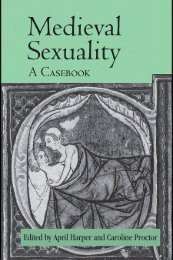Festive Satire: Julian's Misopogon and the New ... - Julian Emperor
Festive Satire: Julian's Misopogon and the New ... - Julian Emperor
Festive Satire: Julian's Misopogon and the New ... - Julian Emperor
You also want an ePaper? Increase the reach of your titles
YUMPU automatically turns print PDFs into web optimized ePapers that Google loves.
<strong>Julian</strong> had invited Antioch to take up with him a privileged relationship-<strong>the</strong> sort ofrelationship that for many reasons he would never cultivate with Constantinople. Buthi<strong>the</strong>rto <strong>the</strong> result of his presence in <strong>the</strong> city had been to make life distinctly lesscomfortable for its inhabitants. On <strong>the</strong> Kalends of January, perhaps in <strong>the</strong> belief that onedemonstrates a privileged relation with a person of power by being rude <strong>and</strong> getting awaywith it, <strong>the</strong> rowdy citizens of Antioch gave vent to <strong>the</strong>ir apprehensions <strong>and</strong> hostilities atwhat was commonly considered to be a season of ritual impunity.Thus <strong>the</strong> festivities of <strong>the</strong> Kalends gave <strong>the</strong> Antiochenes multiple opportunities to jeerat <strong>the</strong>ir emperor. Their jibes fell into two categories: personal remarks <strong>and</strong> politicalreligiouscriticism. The <strong>Misopogon</strong> itself is not our only source for <strong>the</strong>seit is interesting tonote that <strong>the</strong> taunts Ammianus records seem <strong>the</strong> cruellest, yet <strong>Julian</strong> does not respond to<strong>the</strong>m at First <strong>and</strong> foremost, <strong>the</strong> infamous beard. They told him to twist ropes fromit.65 They admonished him in witty anapaests to depilate his cheeks.66 Because <strong>Julian</strong> worehis beard as a polemical statement, to show that he conceived of himself as a paganphilosopher <strong>and</strong> considered Marcus Aurelius his imperial prototype, <strong>the</strong> Antiochenes couldpoke fun at his physical peculiarities <strong>and</strong> his religious policy in one breath. Beard-watchingwas a traditional sport at Antioch. Verus, stationed <strong>the</strong>re when beards were long, provokedSyrian wit by shaving his off to please a woman's whim.'j7 And when Caracalla shaved atAntioch it was considered a noteworthy mark of decaden~e.~~ <strong>Julian</strong>, according toAmmianus, 'was ridiculed as a Cercops, a dwarf spreading out his narrow shoulders <strong>and</strong>wearing a goat's beard, taking huge steps as if he were <strong>the</strong> bro<strong>the</strong>r of Otus <strong>and</strong> Ephialtes,whose height Homer exalts as enormo~s'.~9(This sounds like an insult that wasparticularly suited for dramatization in pantomime.) Various legends survive about <strong>the</strong>Cercopes; we cannot be certain which ones <strong>the</strong> fourth-century satirists at Antioch had inmind. Ovid says that Zeus created <strong>the</strong>m from men who incorrigibly told lies, <strong>and</strong> made<strong>the</strong>m horribly hirsute.70 They were said to have stolen <strong>the</strong> arms of Heracles <strong>and</strong> attackedhim while he was sleeping.7' (Ammianus, in contrast, saw <strong>Julian</strong> as Heracles <strong>and</strong> hisdetractors as attacking Pygmies.7") A K~~KUITES was attributed to Homer. Libanius,knowing this, <strong>and</strong> knowing <strong><strong>Julian</strong>'s</strong> fondness for Alex<strong>and</strong>er, may be alluding very delicatelyto <strong>the</strong> Cercops lampoons in Or. xv. 42. He is trying to placate <strong>the</strong> emperor by citinghistorical examples of great men who showed leniency to <strong>the</strong>ir detractors: 'Alex<strong>and</strong>er wasmuch wronged by <strong>the</strong> orators at A<strong>the</strong>ns. They stirred up trouble for him, <strong>the</strong>y incited <strong>the</strong>democracies against him, <strong>the</strong>y br<strong>and</strong>ed him "Margites" [ano<strong>the</strong>r unattractive characterfrom <strong>the</strong> fringe of <strong>the</strong> Homeric corpus], <strong>the</strong>y insulted him <strong>and</strong> covered him withcontempt'. Alex<strong>and</strong>er could have massacred <strong>the</strong>m, of course, but he listened to <strong>the</strong> oratorDemades instead.Ano<strong>the</strong>r target for satire was <strong><strong>Julian</strong>'s</strong> coinage (<strong>Misopogon</strong> 355D). Socrates says, 'Theyadded that <strong>the</strong> bull which he impressed upon his coin was a symbol of his having desolated64 The chronology of Ammianus' account is con- h<strong>and</strong>le such ropes (338D) Two words from Homerfusing, since he implies that <strong>Julian</strong> wrote <strong>the</strong> <strong>Misopogon</strong> contain a note of menace for <strong>the</strong> erudite: it wasfirst, in response to curial intransigence about price Odysseus' bowstring that hurt <strong>the</strong> suitors' 'unworn <strong>and</strong>control, <strong>and</strong> that ridicule came later: 'volumen tender h<strong>and</strong>s' (Od. 21. 151).composuit invectivum . .. post quae multa in se facete 66 <strong>Misopogon</strong> 345D.dicta comperiens, coactus dissimulare pro tempore, ira67 H. A. Venu VII. 10. The lady was <strong>the</strong> famoussuffiabatur interna. Ridebatur enim ut Cercops .. .' Pan<strong>the</strong>a (Lucian, Imagines 10).(XXII.14. 2-3). Ra<strong>the</strong>r than have <strong>Julian</strong> <strong>the</strong> victim of 68 Dio LXXVIII. 20.unprovoked remarks, Ammianus preferred to present 69 XXII. 14. 3.him as having <strong>the</strong> first word <strong>and</strong> keeping his self-control70 Metamorphoses XIV. 91. The Cercopes had stubbyafterward: 'et quamquam his paribusque de causis legs; <strong><strong>Julian</strong>'s</strong> height was not impressive even to anindignaretur, tacens tamen motumque in animi retinens admirer ('mediocris erat staturae', Ammianus xxv. 4.potestate, sollemnia celebrabat'. This comment leads 22; 'exiguo corpore', XXII. 2. 5). Suetonius, Pennaturally into an account of <strong><strong>Julian</strong>'s</strong> sacrifice on Mt Blasphematon 89-91, stresses <strong>the</strong> Cercopes' badCasius during which he magnanimously pardons an old character <strong>and</strong> mentions a popular etymology derivedenemy (XXII. 14. 4-5).from KQPKOS, tail or membrum virile.6s <strong>Misopogon</strong> 338D, 360D; Socr., HE III. 17. <strong><strong>Julian</strong>'s</strong> 7, Nonnus up. Westermann, Mythogr. 375.retort implies that <strong>the</strong>y might not be tough enough to 72XXII. 12. 4.













